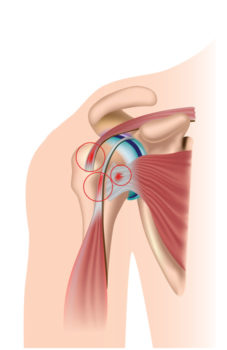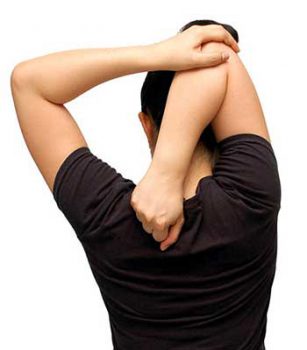 One of the most common muscular complaints I see in clinic is a frozen shoulder. This can occur any time of the year, but I most regularly see them develop around winter. In Western Medicine it is not fully understood why it occurs, as the soft tissue around the shoulder capsule becomes inflamed and stiff. It develops slowly over time, and sometimes self resolves in months or years. Extreme cases can require surgery.
One of the most common muscular complaints I see in clinic is a frozen shoulder. This can occur any time of the year, but I most regularly see them develop around winter. In Western Medicine it is not fully understood why it occurs, as the soft tissue around the shoulder capsule becomes inflamed and stiff. It develops slowly over time, and sometimes self resolves in months or years. Extreme cases can require surgery.
According to Acupuncture, frozen shoulder develops from an invasion of wind-cold which blocks the flow of Qi and blood in the tissue around the shoulder. This causes restriction and pain. Often I hear of patients who have been at the beach in warm weather, and then a cool change comes through, and they wake up with a sore shoulder the next day. This is a wind-cold invasion, its similar how you catch a chill in your neck or develop bell’s palsy in winter. Either you are exposed to extreme weather, or you over work the muscles in the gym and cold invades at the end of your workout while you are sweating. Factors like stress and fatigue can weaken your Qi, which cannot protect the muscle from a cold invasion. Sometimes the body can expel the cold on its own, but most of the time the cold stagnates and freezes up the entire joint.
Common symptoms of frozen shoulder are:
- restricted range of movement, developing suddenly or over weeks
- sharp localised pain in the front or rear of shoulder when lifting your arm up
- a numbness or cold feeling in your shoulder with decreased range of movement
- Increase in shoulder stiffness but a decrease in the pain
Frozen shoulder can become a chronic condition and can take years to resolve. If you feel you are experiencing these early signs then seek medical advice immediately.
Western Medicine’s Treatment Approach
Depending on the type of injury that has occurred to the shoulder, either a cortisone injection or hydra-dilation are suggested as treatment options. Cortisone is a steroid that is used to rapidly reduce inflammation. Often damage and inflammation to one or more of the rotator cuff muscles can cause a frozen shoulder. An accurate injection of cortisone may provide pain relief and in turn help restore shoulder range of motion. Another option is when the cause is adhesive capsulitis, and the fluid in the shoulder joint as turned to jelly. High pressure liquid is used to physically flush out the joint to try and restore movement. These treatments can sometimes be successful but not always.
Can Acupuncture Help?
I use Acupuncture to help provide relief to the pain associated with a frozen shoulder. Often I see in clinic it is caused by RSI type injuries, which results in one or more of the rotator cuff tendons to become inflamed. This can cause pain radiating over the top of the shoulder, front of the shoulder or around the shoulder blade. By helping remove this pain, patients can then perform their rehab exercises better and hopefully regain better movement of their shoulder joint.
There is currently no scientific evidence showing Acupuncture is directly effective for a frozen shoulder. There have been studies that showed a positive effect, but they have either been too small or of low quality that their results can’t be deemed conclusive at this time. There is good quality evidence though showing Acupuncture may help with shoulder pain and shoulder impingement syndrome (combined with exercises). Which are closely related to a frozen shoulder. This suggests that Acupuncture may not directly improve shoulder ROM by itself, but it may work as a viable form of pain relief for the symptoms associated with a frozen shoulder. A study from 2016 concluded “These results demonstrate beneficial effects of contralateral acupuncture in the treatment of chronic shoulder pain, both in terms of pain and function. Future research is required to compare directly the effects of local and contralateral acupuncture and to quantify the specific and non-specific effects.”
Management and Prevention of Frozen Shoulder
- Avoid exposures to cold winds on your bare skin, especially if at the beach or following warm weather
- Keep the shoulder warm and moving
- When showering, slowly walk your hand up the wall to increase range of movement in your shoulder
- Do exercises like Yoga and Pilates which help strengthen joints and improve flexibility
- Don’t be complacent hoping it will heal itself, seek medical advice if it is not improving!
If you would like more information please call the clinic on 9796 2388 to discuss further.


